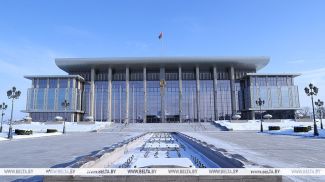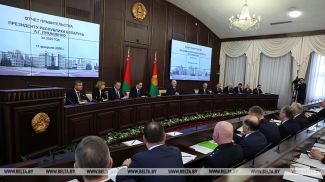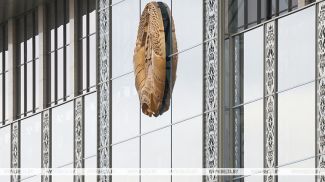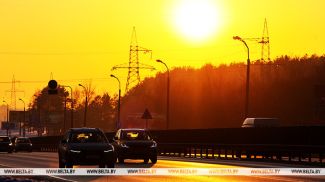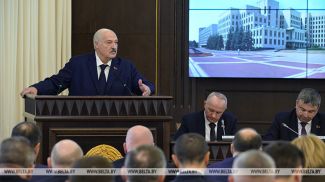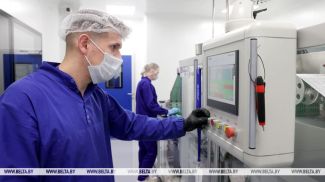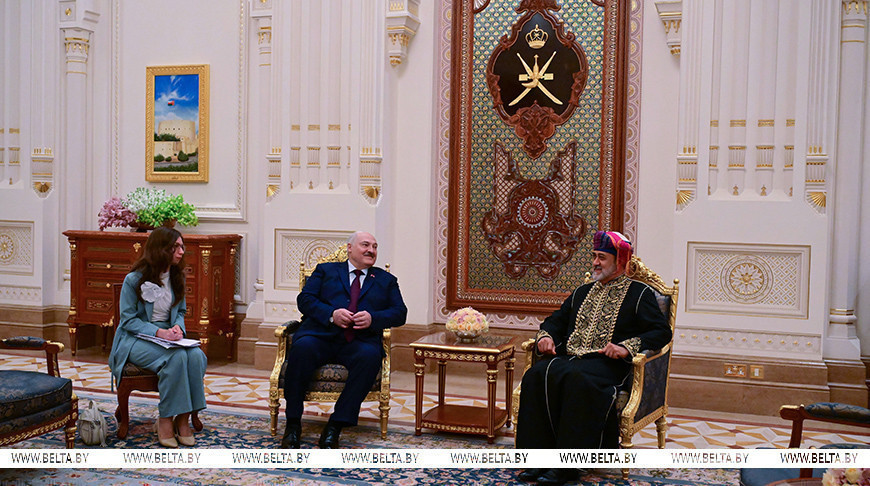
Belarusian President Aleksandr Lukashenko has paid a working visit to Oman. This is already the second visit of the Belarusian head of state to this Middle Eastern country. Back then the parties laid the foundation of the bilateral relations which gradually developed over the following years. In 2024, the intensity of Belarusian-Omani cooperation increased significantly: a business forum, the high-level visits to Muscat, the official visit of the Belarusian prime minister… This is by no means a complete list of all the events. The visit of the Belarusian leader and the high-level talks crowned mutual efforts to raise interaction to a new level. In this article, BelTA summarizes the main results of the Belarusian delegation's work in Oman.
The president arrived to a very warm and friendly welcome. This is not a figure of speech at all. The special attitude was evident even in small things: the national flag on one of the buildings of the Sultan's palace, the lavish welcome ceremony before the official talks between the parties. The frequency of personal contacts between the leaders speaks of great mutual interest. They met several times during the visit. First they discussed strategic matters issues before zooming in on specific programs and projects.
.
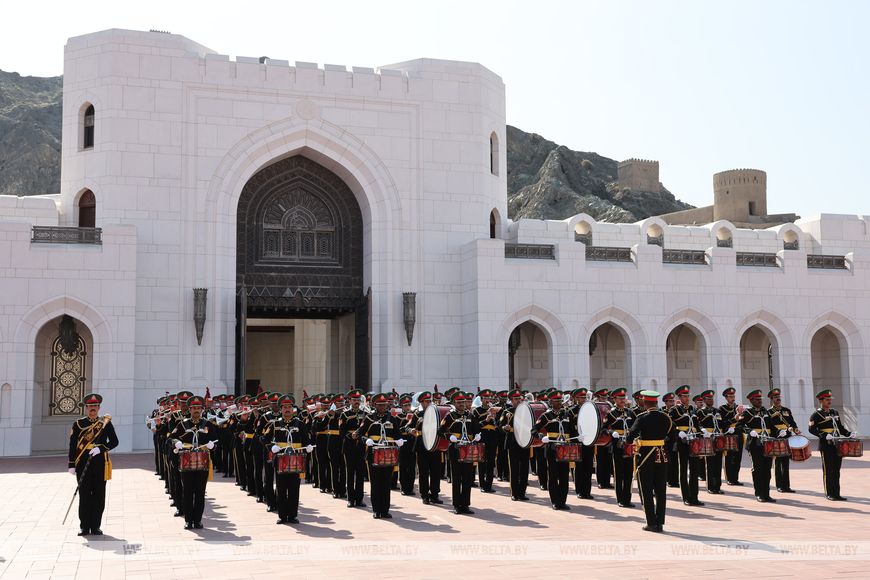
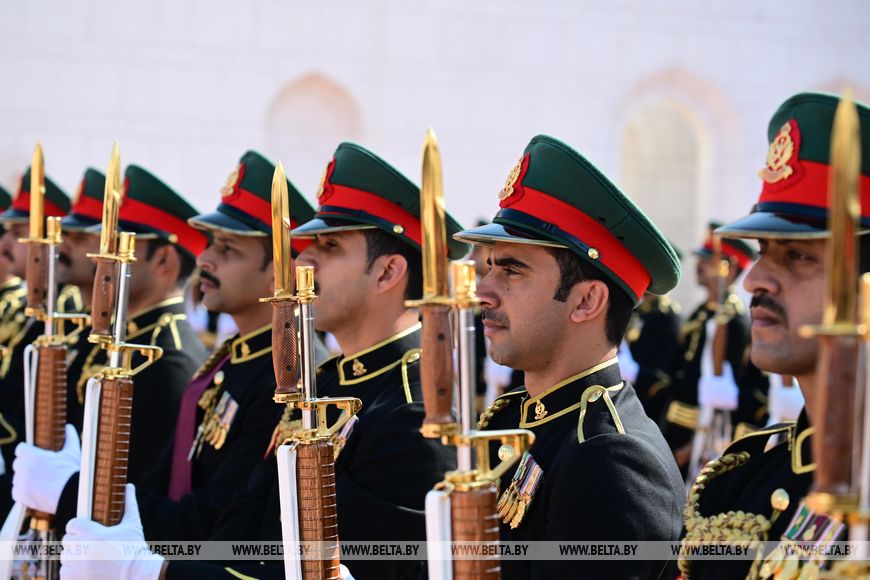
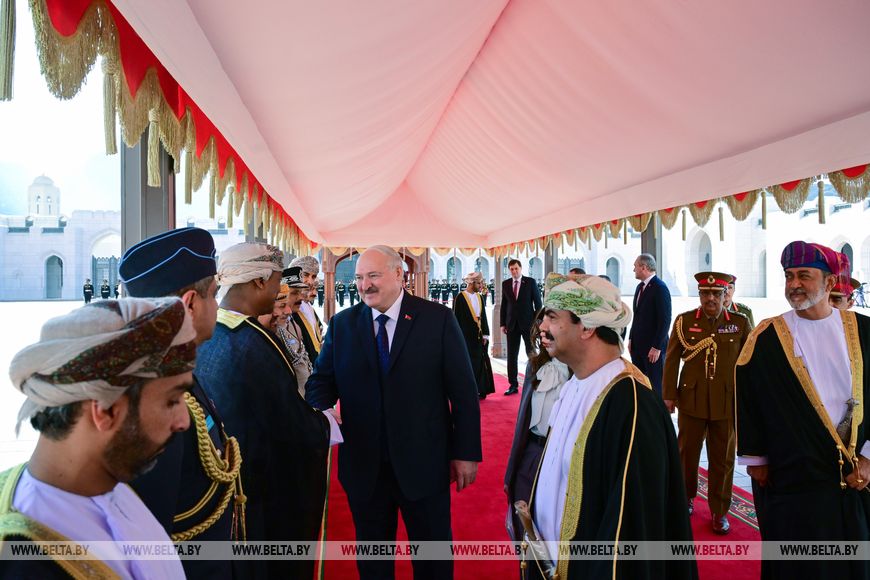 Overall, although it is a working visit, it feels like an official or even state visit. Following the main day of negotiations, one of the country's main newspapers devoted several front pages to the ongoing visit of the Belarusian president.
Overall, although it is a working visit, it feels like an official or even state visit. Following the main day of negotiations, one of the country's main newspapers devoted several front pages to the ongoing visit of the Belarusian president.
What can Belarus offer Oman?
During his visit to Oman, Aleksandr Lukashenko published an article “Belarus and Oman: Traditions of Friendship in a Changing World”. It talks a little about Belarus, modern challenges, and the similarity of approaches and mentalities of the peoples of the two countries.
A significant part of the article is devoted to the promising areas of cooperation between Belarus and Oman. First of all, it is supplies of goods made by Belarusian machine-building, chemical, food, and light industries.
“We have world-class advanced petrochemical enterprises. Biotechnology and pharmaceuticals are among our priority areas of development,” Aleksandr Lukashenko said. “Belarus produces a number of unique drugs for the treatment of cancer, immune and cardiovascular diseases.”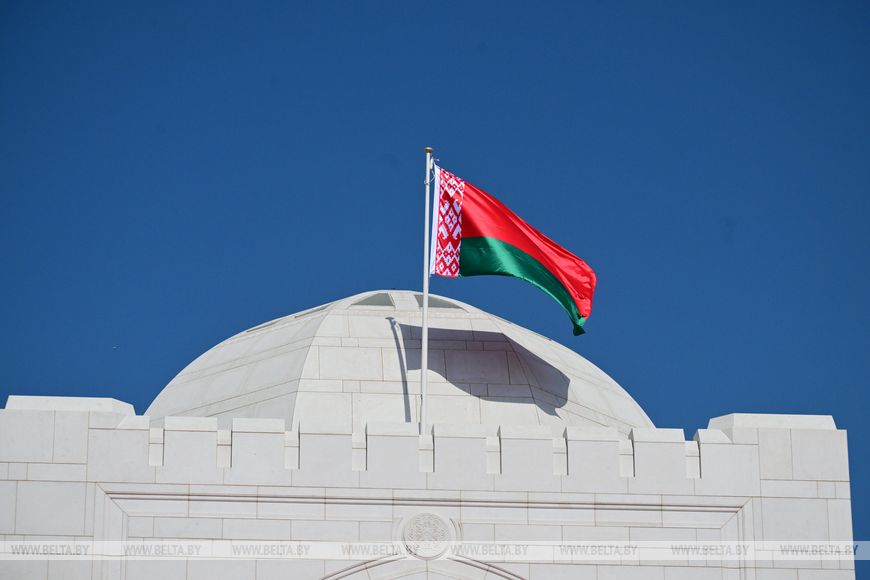 The high quality of Belarusian medicine and advanced treatment technologies have become another hallmark of the country. “We are ready to provide our Omani friends with the services of highly professional doctors, to cooperate in the training of medical personnel and exchange of best practices,” the president said.
The high quality of Belarusian medicine and advanced treatment technologies have become another hallmark of the country. “We are ready to provide our Omani friends with the services of highly professional doctors, to cooperate in the training of medical personnel and exchange of best practices,” the president said.
Belarus can also offer a wide range of high-technology products and solutions, from electric buses and software for smart cities to drones, nanomaterials and satellites.
Belarusian exporters are ready to jointly build presence in new markets as part of Oman's national program to attract foreign investment. Minsk also seeks to raise high-quality foreign direct investment in order to turn into an international trade, logistics and manufacturing hub. Belarus offers excellent business opportunities for Omani companies looking for investment in non-resource industries.
There are proposals to expand educational partnerships. Belarusian educational institutions can train managerial personnel and blue-collar workers for the Omani economy in such fields as engineering, medicine and other areas.
Currently, the governments of Belarus and Oman are working to ease travel between the two countries. The immediate plans include launching a direct flight between the two countries, which, as expected, will give impetus to cooperation in tourism and provide additional business opportunities. Visa requirements for Belarusian citizens traveling to Oman for up to 14 days have already been eased. The parties are also discussing the possibility of signing an agreement on mutual visa waiver in the future.
How did the negotiations go and what did the Sultan offer?
Negotiations in the countries of the region (Oman is no exception) are usually conducted in a semi-closed format. The press is allowed in for literally a couple of minutes to do some protocol footage. On the one hand, money loves silence, and the discussion was centered around trade and economic cooperation. On the other hand, topics like sanctions should be discussed in private.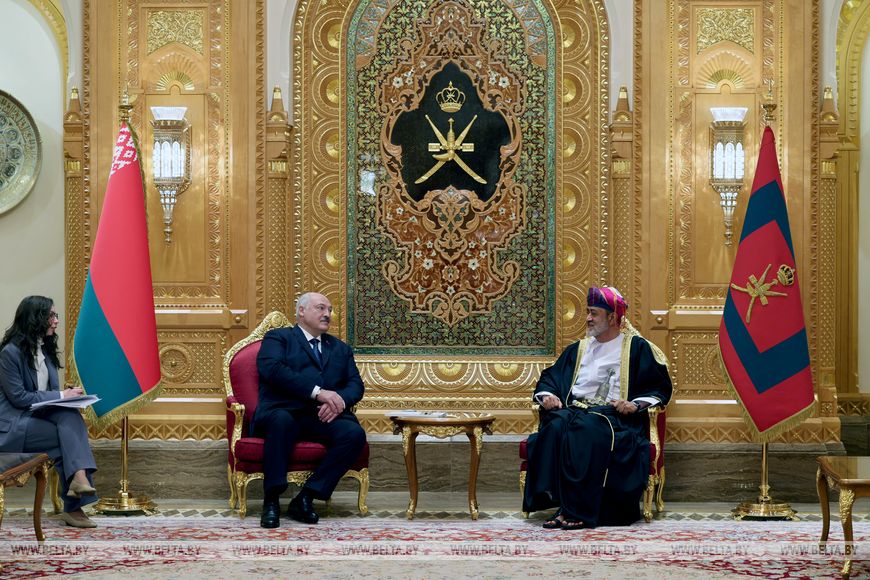
Nevertheless, interviews with ministers of foreign affairs, industry, food and agriculture, who were part of the Belarusian delegation, gave an idea of the issues that were discussed behind closed doors.
Moreover, in a brief interview for Belarusian media, Aleksandr Lukashenko provided a glimpse into what was on the agenda of the talks.
One of Oman's key proposals is to create a hub for Belarusian goods here. The locals have been engaged in commerce for centuries, and Belarus needs such partners very much. The parties intend to update the roadmap for cooperation in the near future, and then the Sultan himself is expected to pay a visit to Minsk.
“Sultan proposed strategic areas of cooperation. It is very important for us to define a point, a port, or maybe we will look at something else, through which we will ship our technologies, which are needed in Oman,” the Belarusian leader said. “Therefore, we will use Belarusian technologies to create joint ventures here and move west, east, north from here, from the Indian Ocean, selling our goods. Sultan made a very good proposal to create a hub here, a center of Belarusian goods.”
“Trading goods first, we are ready to establish joint ventures, to expand production here and trade together along the way. This applies to a lot of products, goods. We do not talk about it publicly for certain reasons,” Aleksandr Lukashenko said.
The matter is about re-export. Simply put, Belarus will supply its goods to Oman, and local businesses, having their own interest and assuming certain risks, will sell these goods further. This is a win-win situation.
The next step is the setting up of joint manufactures, which is also in the interests of Oman that wants to reduce the economy's dependence on the oil and gas sector.
What is the Belarusian approach?
There are a lot of interesting plans and proposals. For example in food industry it is the supply and organization of a joint venture to make baby food, to dry camel milk. The production of vaccines for livestock breeding may be in the pipeline.
There is one thing about Belarus that others respect. We do not pursue some immediate benefit or short-term goals. We seek long-term cooperation; we are ready to exchange technologies.
We remember how major Western partners behaved during the pandemic: they simply fenced off and did not supply anything, even medicines and foodstuffs. In the East, they know that those have betrayed once, will do it again. Here they know how to distinguish between true friends and those for whom cooperation is just business and nothing personal.
Oman is interested in strengthening its technological sovereignty and solving food security issues. Belarus is ready to lend a hand here.
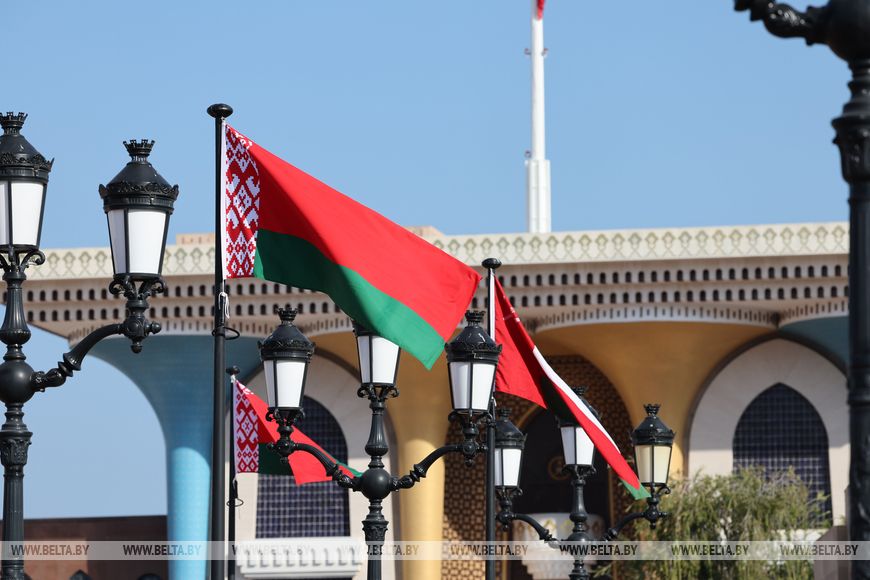
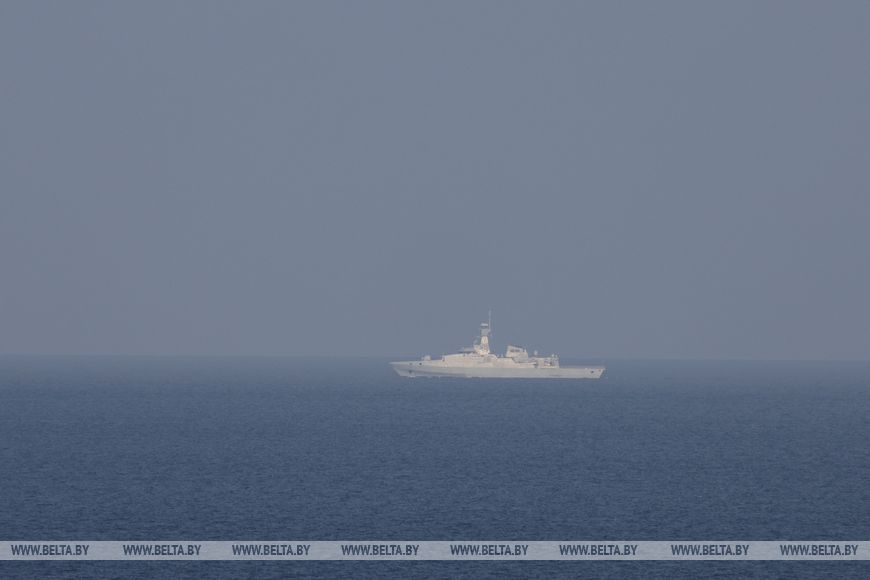
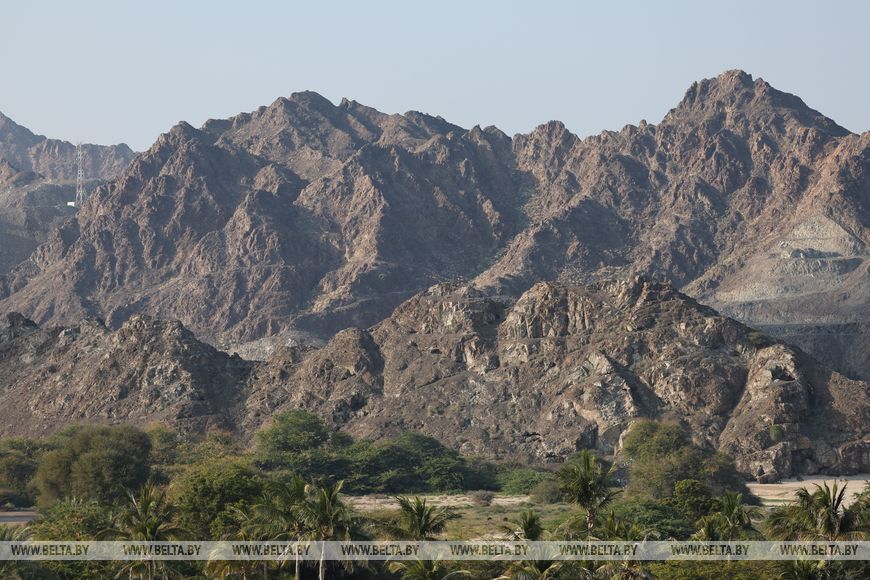
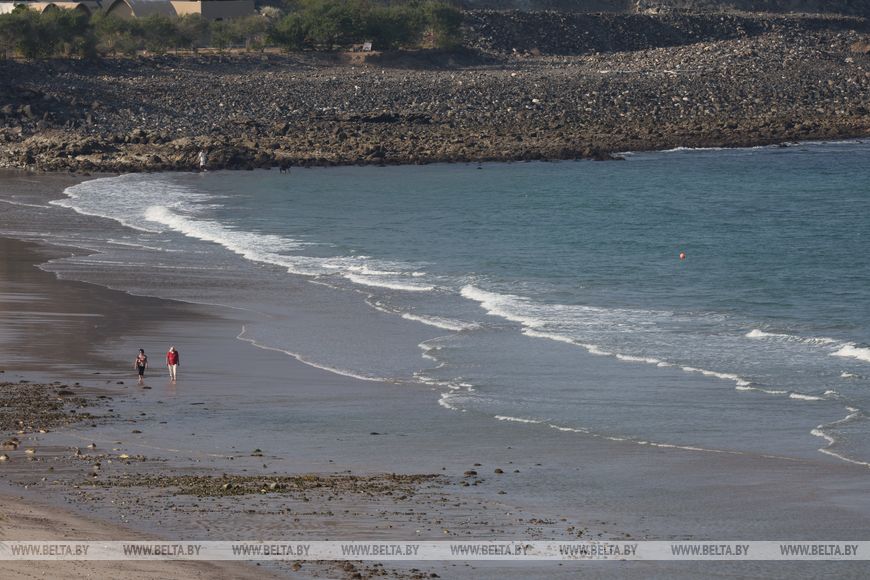
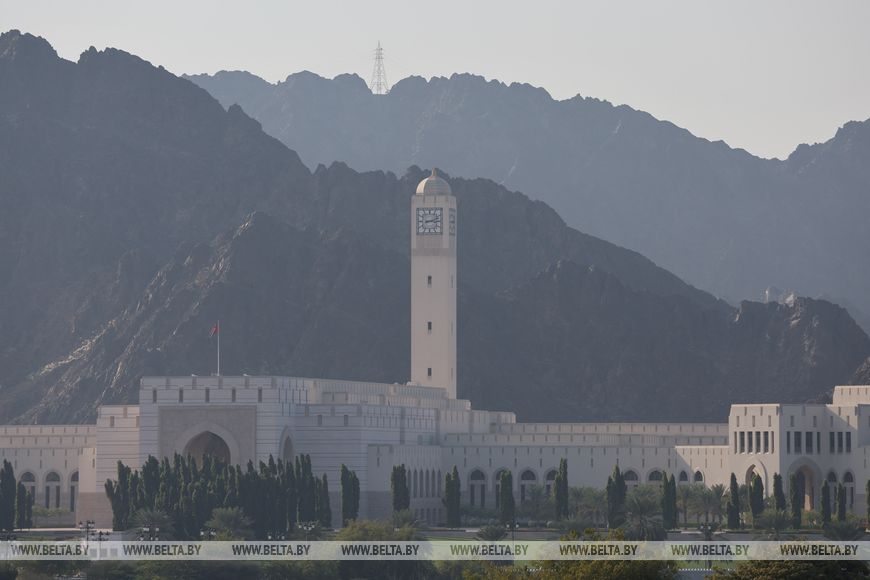
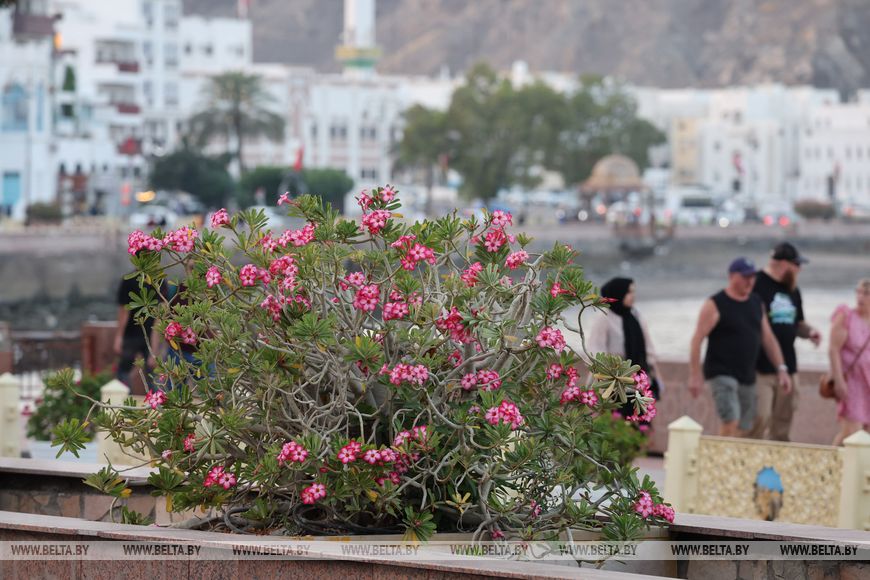
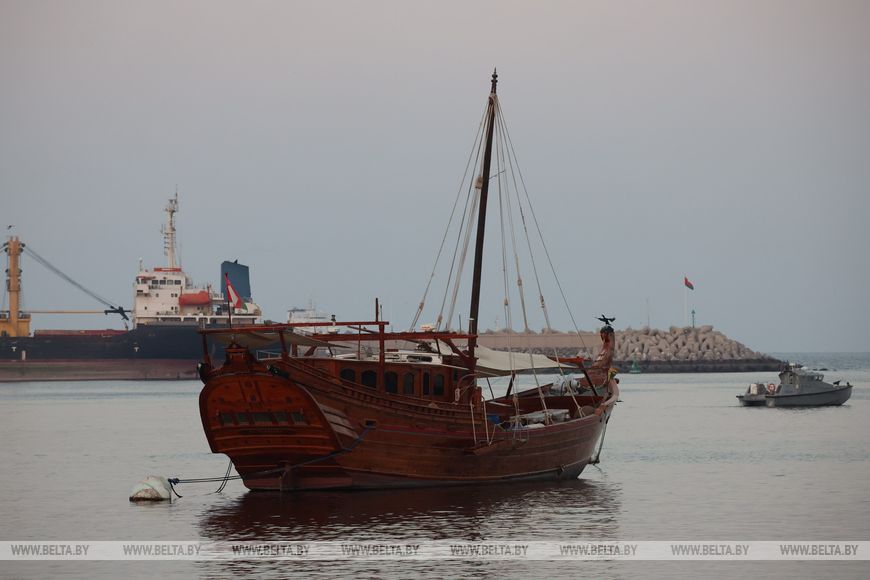
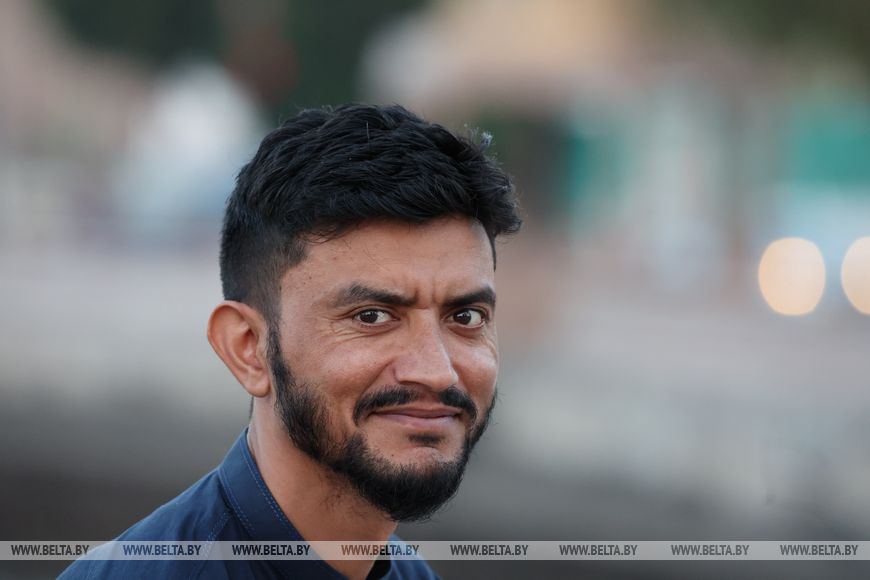
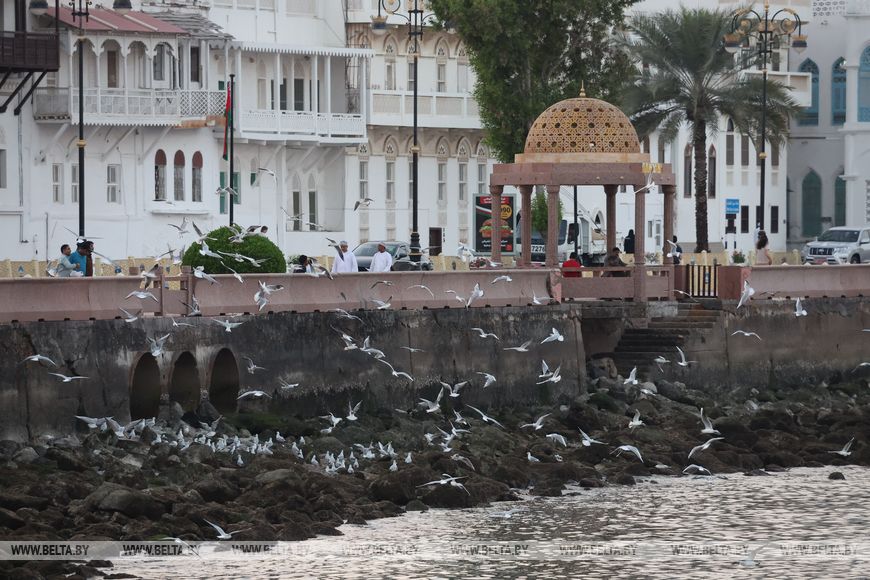
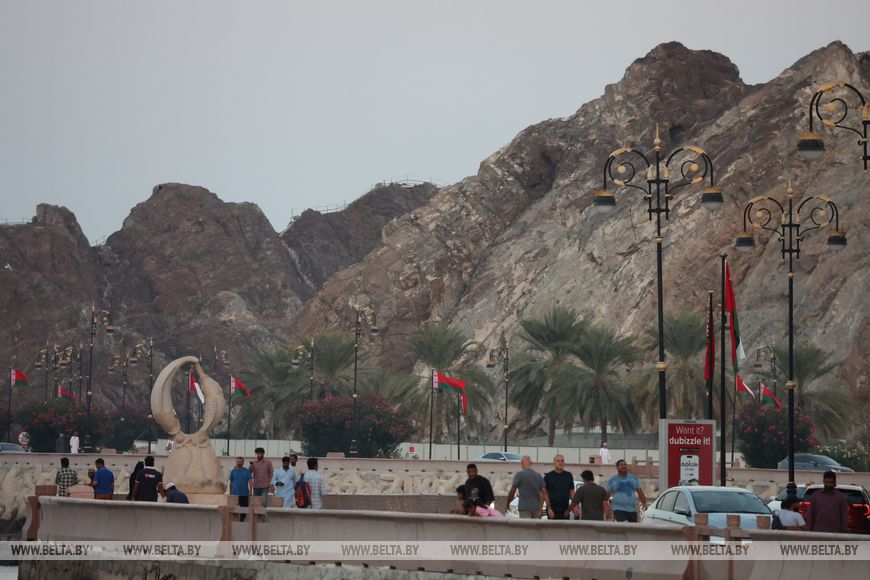
The president arrived to a very warm and friendly welcome. This is not a figure of speech at all. The special attitude was evident even in small things: the national flag on one of the buildings of the Sultan's palace, the lavish welcome ceremony before the official talks between the parties. The frequency of personal contacts between the leaders speaks of great mutual interest. They met several times during the visit. First they discussed strategic matters issues before zooming in on specific programs and projects.


 Overall, although it is a working visit, it feels like an official or even state visit. Following the main day of negotiations, one of the country's main newspapers devoted several front pages to the ongoing visit of the Belarusian president.
Overall, although it is a working visit, it feels like an official or even state visit. Following the main day of negotiations, one of the country's main newspapers devoted several front pages to the ongoing visit of the Belarusian president.
What can Belarus offer Oman?
During his visit to Oman, Aleksandr Lukashenko published an article “Belarus and Oman: Traditions of Friendship in a Changing World”. It talks a little about Belarus, modern challenges, and the similarity of approaches and mentalities of the peoples of the two countries.
A significant part of the article is devoted to the promising areas of cooperation between Belarus and Oman. First of all, it is supplies of goods made by Belarusian machine-building, chemical, food, and light industries.
“We have world-class advanced petrochemical enterprises. Biotechnology and pharmaceuticals are among our priority areas of development,” Aleksandr Lukashenko said. “Belarus produces a number of unique drugs for the treatment of cancer, immune and cardiovascular diseases.”
 The high quality of Belarusian medicine and advanced treatment technologies have become another hallmark of the country. “We are ready to provide our Omani friends with the services of highly professional doctors, to cooperate in the training of medical personnel and exchange of best practices,” the president said.
The high quality of Belarusian medicine and advanced treatment technologies have become another hallmark of the country. “We are ready to provide our Omani friends with the services of highly professional doctors, to cooperate in the training of medical personnel and exchange of best practices,” the president said.Belarus can also offer a wide range of high-technology products and solutions, from electric buses and software for smart cities to drones, nanomaterials and satellites.
Belarusian exporters are ready to jointly build presence in new markets as part of Oman's national program to attract foreign investment. Minsk also seeks to raise high-quality foreign direct investment in order to turn into an international trade, logistics and manufacturing hub. Belarus offers excellent business opportunities for Omani companies looking for investment in non-resource industries.
There are proposals to expand educational partnerships. Belarusian educational institutions can train managerial personnel and blue-collar workers for the Omani economy in such fields as engineering, medicine and other areas.
Currently, the governments of Belarus and Oman are working to ease travel between the two countries. The immediate plans include launching a direct flight between the two countries, which, as expected, will give impetus to cooperation in tourism and provide additional business opportunities. Visa requirements for Belarusian citizens traveling to Oman for up to 14 days have already been eased. The parties are also discussing the possibility of signing an agreement on mutual visa waiver in the future.
How did the negotiations go and what did the Sultan offer?
Negotiations in the countries of the region (Oman is no exception) are usually conducted in a semi-closed format. The press is allowed in for literally a couple of minutes to do some protocol footage. On the one hand, money loves silence, and the discussion was centered around trade and economic cooperation. On the other hand, topics like sanctions should be discussed in private.

Nevertheless, interviews with ministers of foreign affairs, industry, food and agriculture, who were part of the Belarusian delegation, gave an idea of the issues that were discussed behind closed doors.
Moreover, in a brief interview for Belarusian media, Aleksandr Lukashenko provided a glimpse into what was on the agenda of the talks.
One of Oman's key proposals is to create a hub for Belarusian goods here. The locals have been engaged in commerce for centuries, and Belarus needs such partners very much. The parties intend to update the roadmap for cooperation in the near future, and then the Sultan himself is expected to pay a visit to Minsk.
“Sultan proposed strategic areas of cooperation. It is very important for us to define a point, a port, or maybe we will look at something else, through which we will ship our technologies, which are needed in Oman,” the Belarusian leader said. “Therefore, we will use Belarusian technologies to create joint ventures here and move west, east, north from here, from the Indian Ocean, selling our goods. Sultan made a very good proposal to create a hub here, a center of Belarusian goods.”
“Trading goods first, we are ready to establish joint ventures, to expand production here and trade together along the way. This applies to a lot of products, goods. We do not talk about it publicly for certain reasons,” Aleksandr Lukashenko said.
The matter is about re-export. Simply put, Belarus will supply its goods to Oman, and local businesses, having their own interest and assuming certain risks, will sell these goods further. This is a win-win situation.
The next step is the setting up of joint manufactures, which is also in the interests of Oman that wants to reduce the economy's dependence on the oil and gas sector.
What is the Belarusian approach?
There are a lot of interesting plans and proposals. For example in food industry it is the supply and organization of a joint venture to make baby food, to dry camel milk. The production of vaccines for livestock breeding may be in the pipeline.
There is one thing about Belarus that others respect. We do not pursue some immediate benefit or short-term goals. We seek long-term cooperation; we are ready to exchange technologies.
We remember how major Western partners behaved during the pandemic: they simply fenced off and did not supply anything, even medicines and foodstuffs. In the East, they know that those have betrayed once, will do it again. Here they know how to distinguish between true friends and those for whom cooperation is just business and nothing personal.
Oman is interested in strengthening its technological sovereignty and solving food security issues. Belarus is ready to lend a hand here.

In the same vein the parties are discussing cooperation in industry, supplies and possible assembly of machine-building goods (they think to start with tractors) with an eye on third country markets. The sea, trade routes and the necessary port infrastructure are available nearby.
What is Sohar?
Aleksandr Lukashenko also got familiar with the logistical opportunities of Oman as he toured SOHAR Port and Freezone in the north of the country.
The head of state was given a detailed tour of the port and freezone and was briefed about its operations and enterprises located there, logistical advantages, and infrastructure. The parties discussed the prospects for utilizing local opportunities to promote Belarusian-Omani cooperation, to supply and re-export Belarusian products and set up joint ventures. Aleksandr Lukashenko compared notes with the members of the Belarusian delegation on the spot and gave a number of practical instructions.
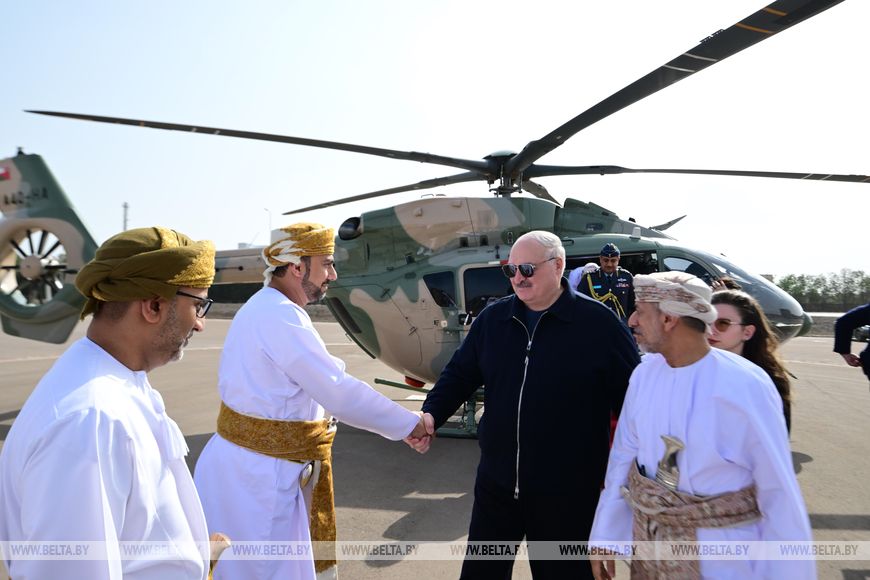
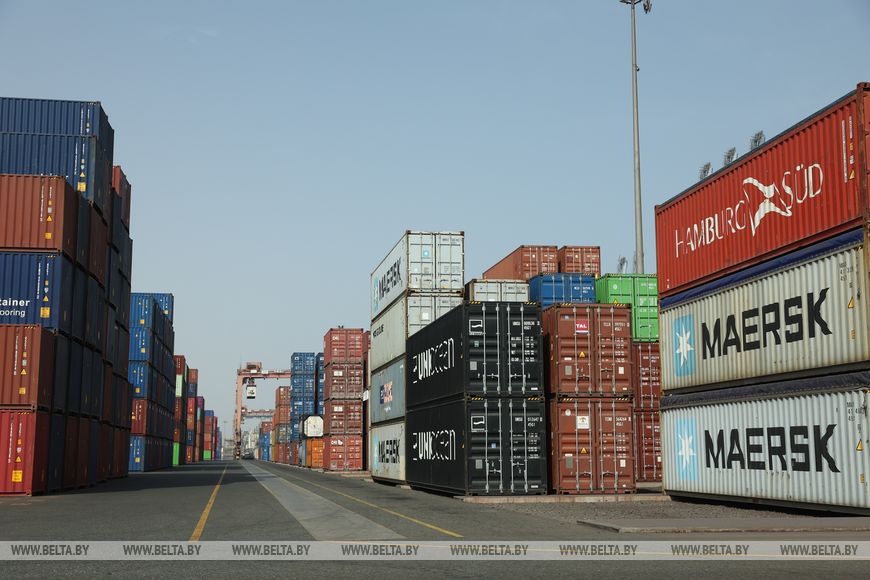
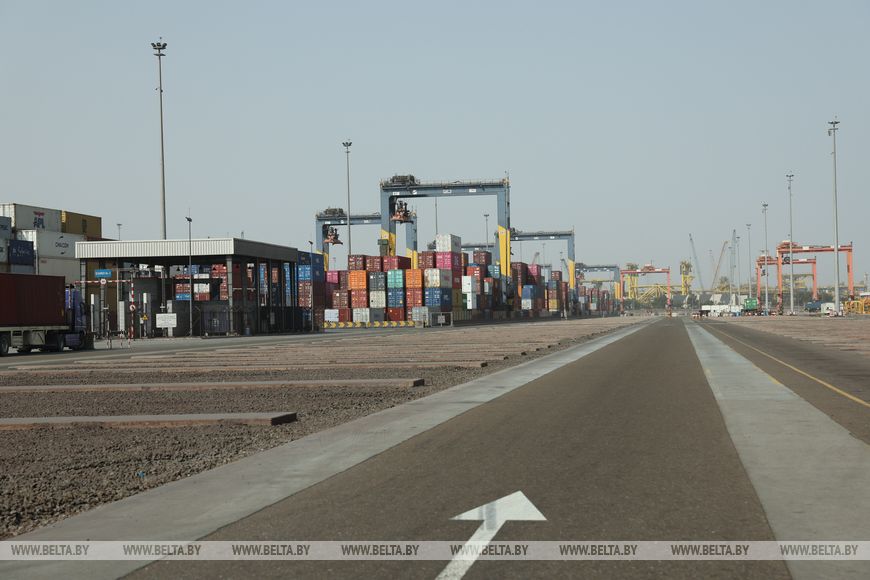
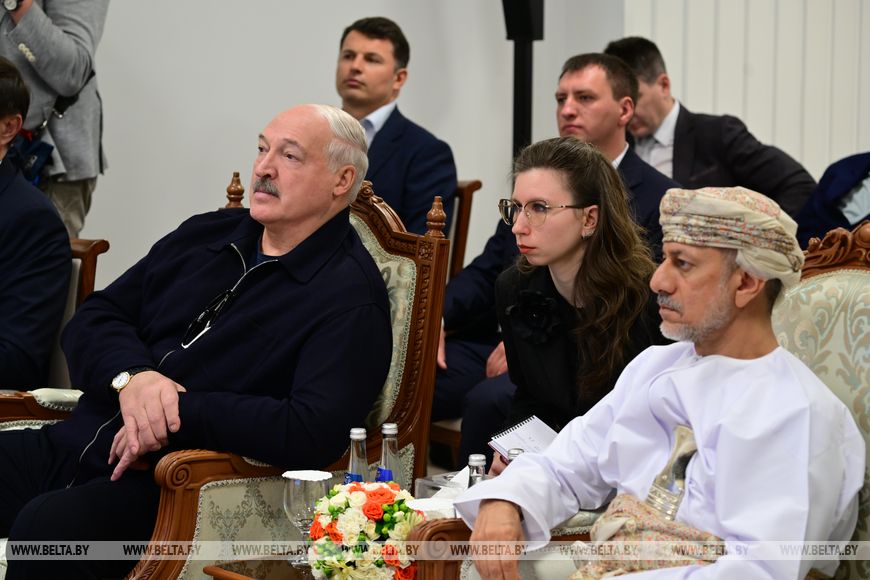
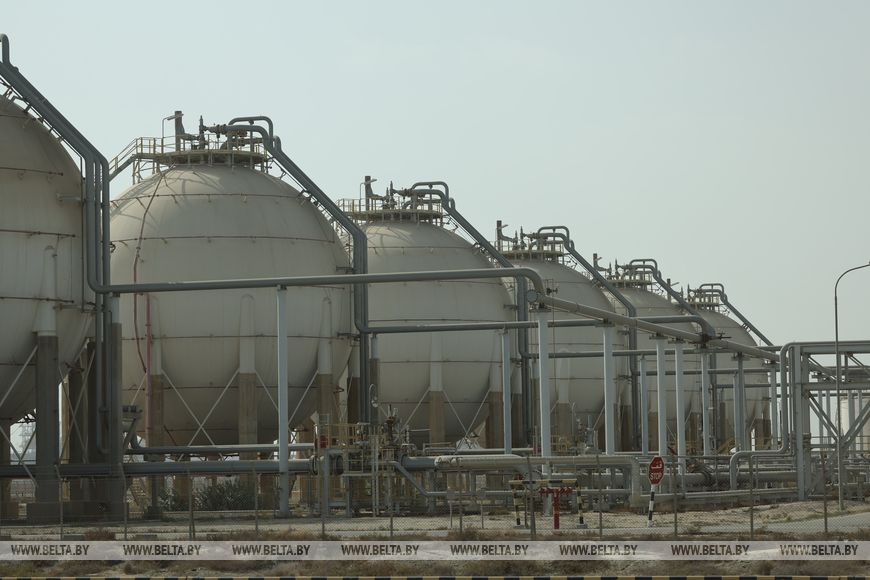
Simply put, the port and the freezone is a huge area bussing with business and production activities. For example, iron ore is delivered by ship from Brazil. Some of it is used for domestic consumption, the rest is exported. It is the same with flour milling and sugar production: they buy raw materials, make goods, ship and sell.
Oman's logistical capabilities can be seen with the naked eye if you go into any large shopping center and find a department with fresh fruits and vegetables. the plates with the name and price of the goods indicate the country of origin. So, one can study geography: UAE, Kenya, China, Pakistan, Lebanon, South Africa, Uganda, Madagascar, India, Egypt, Netherlands... And the real discovery for Belarusian journalists was mandarins from Australia!
At the end of his visit to the SOHAR Port and Freezone, Aleksandr Lukashenko left a note and described these facilities are true gems of Oman, and the new North-South route. The president expressed the hope that they will become a reliable launching pad for Belarus-Oman cooperation.
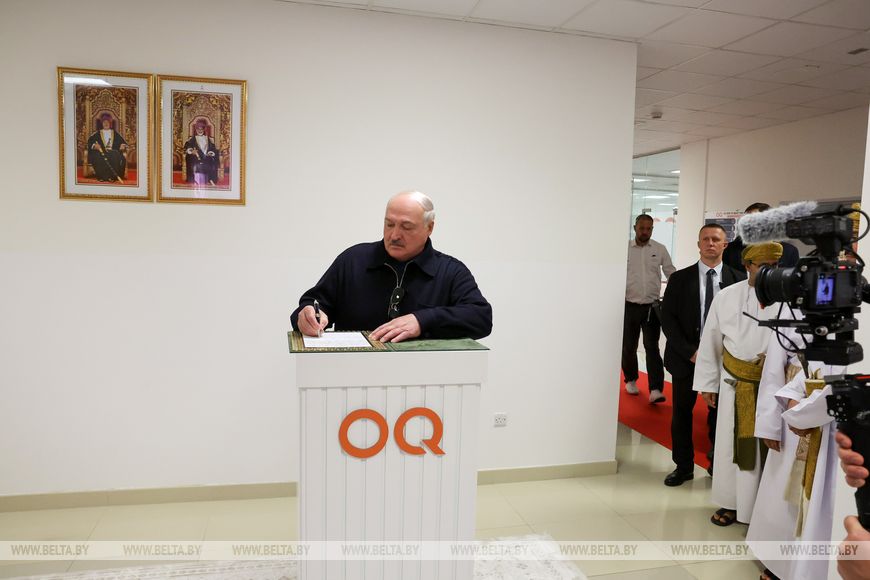
“The purpose of the visit to SOHAR port and freezone is to select a site for joint ventures and the project to establish a hub of Belarusian industrial goods in the Sultanate of Oman in order to promote our goods to the markets of third countries,” Belarusian Industry Minister Aleksandr Yefimov told the media.
What are the results? Does Belarus have its own lobby in Oman?
It is important to dispel the myth that Belarus is some distant and little-known country for Oman. Quite the opposite. Let’s cite some example. The head of the Oman National Museum is half Belarusian. His mother is a native of Belarus. The museum is a strategic institution with a special status, directly subordinate to the Sultan. Moreover, the first international exhibition that opened in the museum was dedicated to Belarus. It deals with the issues of national identity, defining one's place in the global world.
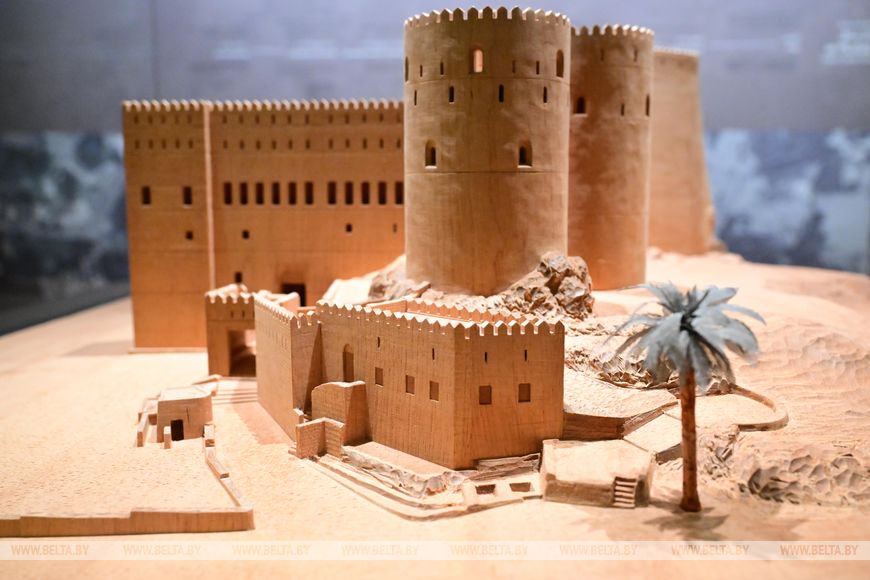
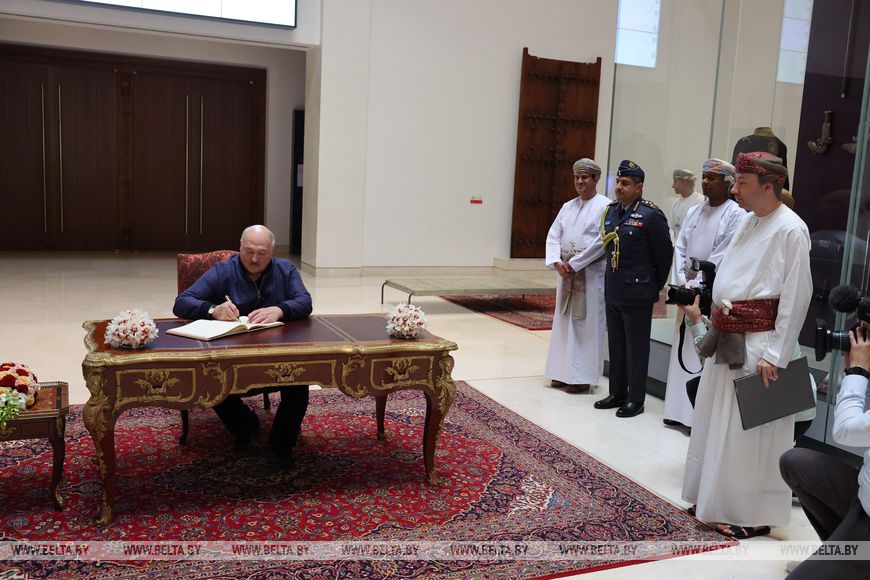
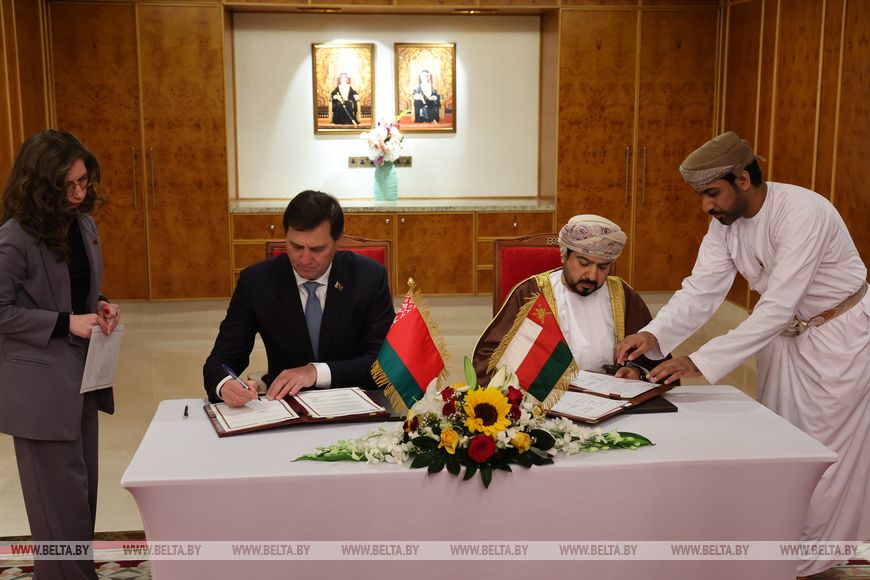

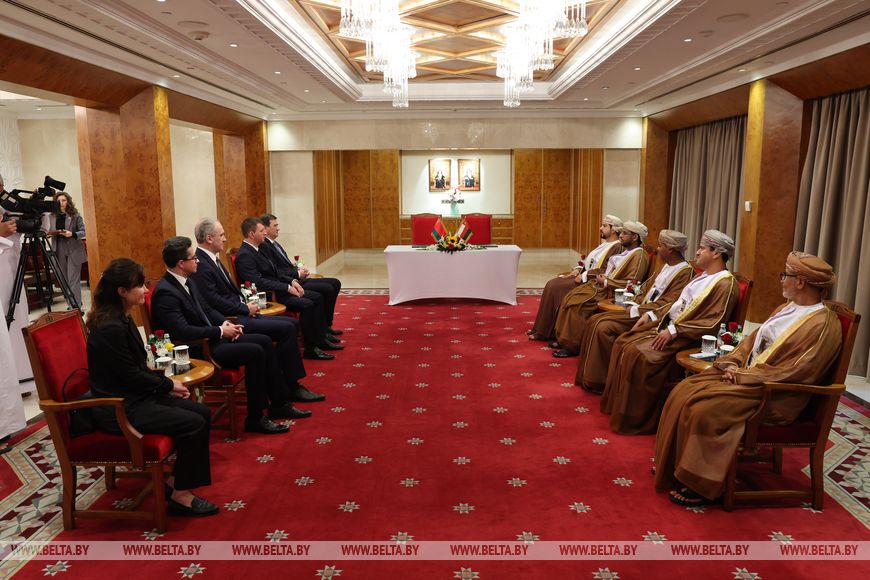
To summarize, we can say that prospects for cooperation are many and that both sides are willing to cooperate. The main thing now is to take advantage of this historic opportunity.
What is Sohar?
Aleksandr Lukashenko also got familiar with the logistical opportunities of Oman as he toured SOHAR Port and Freezone in the north of the country.
The head of state was given a detailed tour of the port and freezone and was briefed about its operations and enterprises located there, logistical advantages, and infrastructure. The parties discussed the prospects for utilizing local opportunities to promote Belarusian-Omani cooperation, to supply and re-export Belarusian products and set up joint ventures. Aleksandr Lukashenko compared notes with the members of the Belarusian delegation on the spot and gave a number of practical instructions.





The president toured a large enterprise that produces polymer goods. It is owned by a major Omani company that is engaged in oil and gas exploration and production, refining, petrochemicals, trade, alternative energy, power generation, and infrastructure.
Simply put, the port and the freezone is a huge area bussing with business and production activities. For example, iron ore is delivered by ship from Brazil. Some of it is used for domestic consumption, the rest is exported. It is the same with flour milling and sugar production: they buy raw materials, make goods, ship and sell.
Oman's logistical capabilities can be seen with the naked eye if you go into any large shopping center and find a department with fresh fruits and vegetables. the plates with the name and price of the goods indicate the country of origin. So, one can study geography: UAE, Kenya, China, Pakistan, Lebanon, South Africa, Uganda, Madagascar, India, Egypt, Netherlands... And the real discovery for Belarusian journalists was mandarins from Australia!
At the end of his visit to the SOHAR Port and Freezone, Aleksandr Lukashenko left a note and described these facilities are true gems of Oman, and the new North-South route. The president expressed the hope that they will become a reliable launching pad for Belarus-Oman cooperation.

“The purpose of the visit to SOHAR port and freezone is to select a site for joint ventures and the project to establish a hub of Belarusian industrial goods in the Sultanate of Oman in order to promote our goods to the markets of third countries,” Belarusian Industry Minister Aleksandr Yefimov told the media.
What are the results? Does Belarus have its own lobby in Oman?
It is important to dispel the myth that Belarus is some distant and little-known country for Oman. Quite the opposite. Let’s cite some example. The head of the Oman National Museum is half Belarusian. His mother is a native of Belarus. The museum is a strategic institution with a special status, directly subordinate to the Sultan. Moreover, the first international exhibition that opened in the museum was dedicated to Belarus. It deals with the issues of national identity, defining one's place in the global world.
“It is important for us, too,” Aleksandr Lukashenko said.
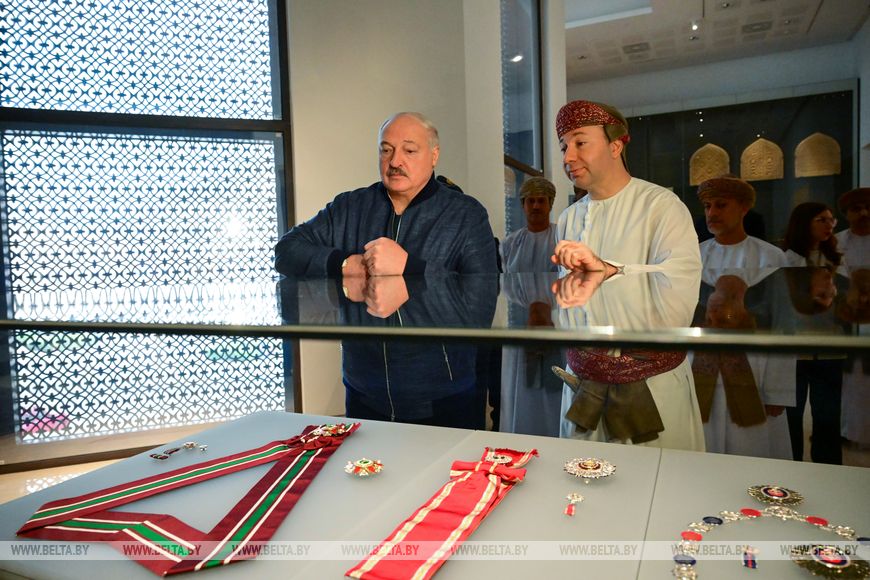
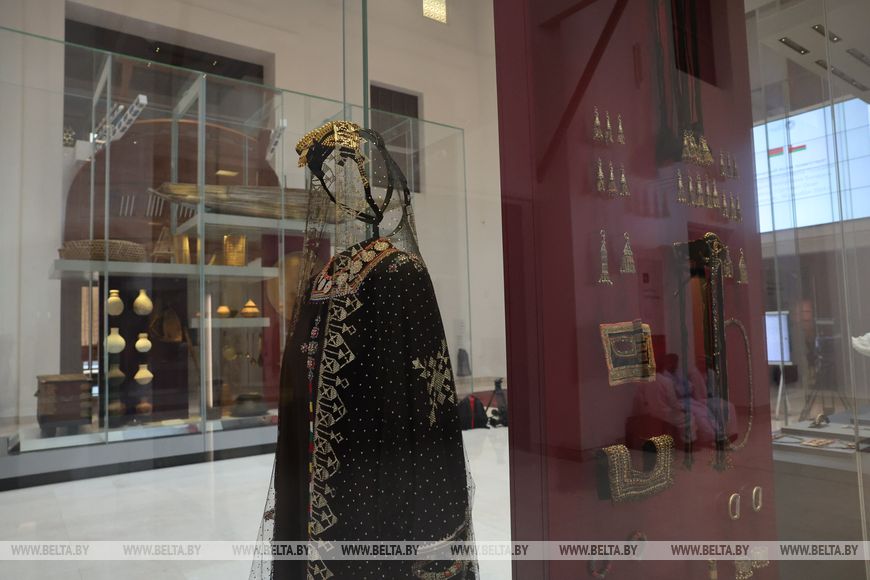




Let’s tick some boxes. The current industry minister Oman used to work as honorary consul of Belarus in this country. The new honorary consul works in the oil and gas industry. The minister of health of Oman has visited Belarus many times. He is a doctor and came to Belarus to learn the practices at the transplantology center.
It may be added that the countries have been developing cooperation in culture for a long time. A few years ago, the Sultan supervised the relevant ministry and now this sector is supervised by the Crown Prince.
So, there are enough people in Oman (even at the highest level) who know what Belarus is and who appreciate its opportunities.
Aleksandr Lukashenko recalled that he met Haitham bin Tariq Al Said, who has been heading the Sultanate since 2020, 17 years ago. “He welcomed and accompanied me then. So we have already known each other. It was easy for us to negotiate," the head of state recalled.
In the joint statement of the leaders on the occasion of Aleksandr Lukashenko’s visit to Oman, the parties welcomed the strengthening of bilateral ties and emphasized the importance of deepening partnership in economy, politics and culture. Clean energy, tourism, education, healthcare, technology, transportation and logistics were identified as areas for expanding the partnership.
The parties welcomed bilateral efforts to boost industrial cooperation, including joint projects to assemble machinery in Oman. The leaders called for cooperation in agriculture and food security and expressed support for joint projects in baby food and dairy products.
Aleksandr Lukashenko discussed practical aspects of the implementation of the agreements with Deputy Prime Minister for the Council of Ministers Sayyid Fahd bin Mahmoud Al Said, the second person in the state.
“Together with Sultan we actually defined our action plan. We have set up an intergovernmental commission and since yesterday we have started working out a roadmap, a plan of our actions. The Sultan of Oman will come to Belarus in the middle of next year. We will approve this roadmap and the plan,” the president said.
Members of the Belarusian delegation also worked actively during the visit. Among them were the minister of foreign affairs, the industry minister and the agriculture and food minister. They held a series of meetings and negotiations with partners and discussed specific projects, worked out local roadmaps for cooperation and signed bilateral documents. In accordance with these roadmaps the parties will exchange business trips to build up long-term reliable relations.
So, there are enough people in Oman (even at the highest level) who know what Belarus is and who appreciate its opportunities.
Aleksandr Lukashenko recalled that he met Haitham bin Tariq Al Said, who has been heading the Sultanate since 2020, 17 years ago. “He welcomed and accompanied me then. So we have already known each other. It was easy for us to negotiate," the head of state recalled.
In the joint statement of the leaders on the occasion of Aleksandr Lukashenko’s visit to Oman, the parties welcomed the strengthening of bilateral ties and emphasized the importance of deepening partnership in economy, politics and culture. Clean energy, tourism, education, healthcare, technology, transportation and logistics were identified as areas for expanding the partnership.
The parties welcomed bilateral efforts to boost industrial cooperation, including joint projects to assemble machinery in Oman. The leaders called for cooperation in agriculture and food security and expressed support for joint projects in baby food and dairy products.
Aleksandr Lukashenko discussed practical aspects of the implementation of the agreements with Deputy Prime Minister for the Council of Ministers Sayyid Fahd bin Mahmoud Al Said, the second person in the state.
“Together with Sultan we actually defined our action plan. We have set up an intergovernmental commission and since yesterday we have started working out a roadmap, a plan of our actions. The Sultan of Oman will come to Belarus in the middle of next year. We will approve this roadmap and the plan,” the president said.
Members of the Belarusian delegation also worked actively during the visit. Among them were the minister of foreign affairs, the industry minister and the agriculture and food minister. They held a series of meetings and negotiations with partners and discussed specific projects, worked out local roadmaps for cooperation and signed bilateral documents. In accordance with these roadmaps the parties will exchange business trips to build up long-term reliable relations.



To summarize, we can say that prospects for cooperation are many and that both sides are willing to cooperate. The main thing now is to take advantage of this historic opportunity.













